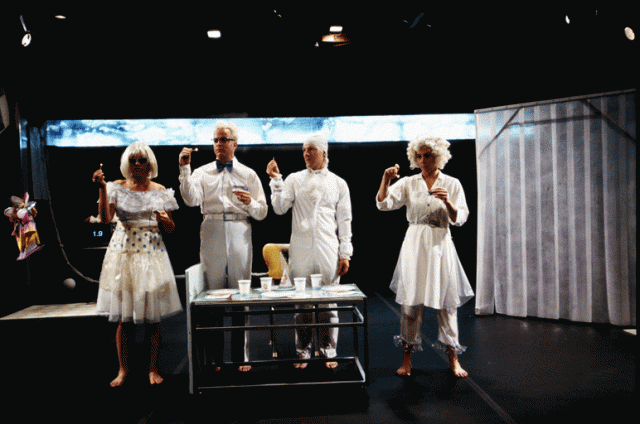
 Match-Play, a collaboration of choreographer Deborah Hay and Austin-based theater collective Rude Mechs, debuted this week at New York Live Arts. In this theatrical reimagination of Hay’s 2004 Bessie Award-winning dance, The Match, Hay, in concert with Rude Mechs, puts movement into words with a quirky, sometimes laugh-out-loud funny, sometimes poignant onstage search for the meaning of life.
Match-Play, a collaboration of choreographer Deborah Hay and Austin-based theater collective Rude Mechs, debuted this week at New York Live Arts. In this theatrical reimagination of Hay’s 2004 Bessie Award-winning dance, The Match, Hay, in concert with Rude Mechs, puts movement into words with a quirky, sometimes laugh-out-loud funny, sometimes poignant onstage search for the meaning of life.
The play’s five characters are a sampling of odd personalities: Lana, whose silent monologue opens the show; Thomas, returning from a trip to France; Heather, whose exes are a long list of cat photos; Barney, whose neuroses drive the action; and Costello, an answering machine. An offstage HAL-esque character, the answering machine challenges the audience to wedge the “fingers of consciousness” into the space between our perception and reality; to try and grasp what’s real.
The introduction of dance into the piece comes with Barney, who enters and proclaims that he is going to do a dance now. He records everything on a handheld tape recorder, and then sends it off to random addresses without listening to the tape. Barney, along with the rest of the cast, is struggling with his own mind and search for meaning. Nothing is worth remembering, because everything means nothing.
Dance, throughout the play, is functioning as a representation of life. It starts out randomly: broad, inexact movement interspersed with the action, dialogue, and asides of the play. It’s passive, general movement, which leads one to think about whether or not this play even needed the element of dance. It, too, seems to mean nothing.
However, this sweeping locomotion evolves, over the course of the piece, into more detailed choreography. These moments of deliberate movement, often that accompany a character’s story, discovery, or actions, increase in frequency and importance as the play progresses. It becomes the only thing not discussed onstage, and eventually, full sections of the piece exist as movement only.
Ultimately, Barney and his housemates realize that life is a mildly unsatisfying amalgamation of everything that isn’t worth remembering. The search for meaning manifests itself in arbitrary objects, ideas and experiences. The personified answering machine; the match that could have lit everything on fire, but didn’t; the drinking game you just have to win; the idea that good luck is “the Santa Claus of randomness.”
And in the end, it turns out that life actually is arbitrary objects, experiences, and ideas—and little more. What were once the predictable and routine moments of everyday life become life itself. And everything that once meant nothing, now means everything.